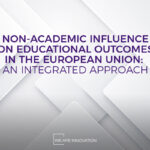Non-academic Influence On Educational Outcomes In The European Union: An Integrated Approach
Our recent literature review explores how factors beyond academics—like nutrition, physical health, and psychology—impact students’ performance in the European Union’s complex education systems. As the authors Anderson Riverol, Juan Pablo Molero, and José Alberto León point out, schools face pressure to achieve excellence and efficiency amid growing diversity. This prompts questions about whether conventional teaching methods are enough to prepare students for the 21st century.
The authors use a mix of qualitative analysis and bibliographic review to provide a nuanced look at interconnections between lifestyle, cognitive function, and academic success. Their goal is to inform better policy and practice in classrooms and broader educational strategies.
The review suggests schools should see students as whole people. It highlights real issues like school failure and dropout rates, especially among neurodivergent learners. Findings link healthy daily habits to improved concentration and thinking. As such, the authors advocate schools teach and integrate good nutrition, exercise, sleep and other “brain-boosting” routines.
While ambitious, the authors compel schools to re-evaluate conventions, open up to new ideas, and embrace more inclusive, tailored pedagogy. They make the case that simple, overlooked lifestyle factors could dramatically empower student outcomes.
This literature review challenges critical assumptions in European Union education. It offers thoughtful analysis and prompts discussion around preparative, creative reforms. The authors stake an ambitious vision for the future that supports every student’s growth on their own terms. Further debate may well shape education policy for decades to come.











